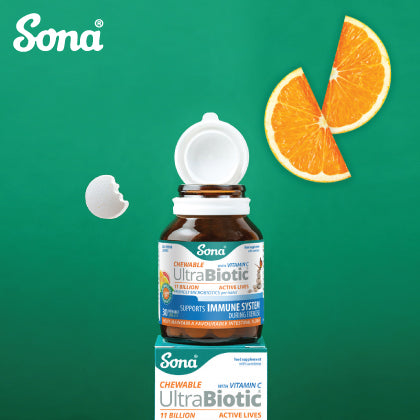
Can Probiotics Improve Nutrient Absorption?
Nutrients are compounds found in food that are essential for health and wellbeing.
There are 6 essential nutrients that the body needs to function correctly: carbohydrates, fats, proteins, vitamins, minerals, and water. Consuming a balanced and well-rounded diet, one that contains a variety of each of these nutrients, provides the body with the substances necessary to regulate its biochemical processes. Yet, even when we are consuming a healthy balance of all these 6 nutrients, our body’s ability to absorb nutrients can sometimes be decreased. Fortunately, there are certain things we can do to improve our body’s ability to absorb nutrients, allowing us to get the most out of our diet and support optimal body function. Supplementing with probiotics being one of them.
In this article you can find:
- How does the body absorb nutrients?
- What factors can negatively affect nutrient absorption?
- What is a probiotic?
- How does a probiotic support nutrient absorption?
- What probiotic should I take to improve nutrition absorption?
How does the body absorb nutrients?
The body absorbs nutrients through chemical and mechanical digestion. Mechanical digestion involves physically breaking down food substances into smaller particles (e.g., chewing food with our teeth in the mouth) so that we can more efficiently undergo chemical digestion. Chemical digestion further degrades the food by secreting enzymes so that it can be absorbed into the bloodstream. It is then transported to different areas of the parts of the body where is it needed.
What factors can negatively affect nutrient absorption?
There are many factors than can negatively affect nutrient absorption. This includes gastrointestinal issues such as IBS and coeliac disease, over-consumption of processed foods, high-sugar foods, and alcohol, some medications, and high levels of stress.
What is a probiotic?
Probiotics are a combination of live beneficial bacteria and/or yeasts that are naturally found within the body. They provide the body with various health benefits because of their ability to restore the natural balance of gut bacteria. An imbalance of gut bacteria means that there are more bad bacteria present then there are good bacteria, which can increase risk of illness and disease.
How does a probiotic support nutrient absorption?
Supplementing with probiotics helps colonize the gut with good bacteria. This benefits the body by fighting off bad bacteria by preventing them from over growing as they compete with them for space and nutrients. Probiotics even produce different acids to lower the pH of our gut, making it unfavourable for bad bacteria to live there. While we can tolerate a certain percentage of bad bacteria within the gut, having too much can cause difficulty with processing food and eliminating waste, altering nutrition absorption. This can cause stomach disturbances like gas, bloating, constipation, diarrhoea, and heartburn.
What probiotic should I take to improve nutrition absorption?
Sona UltraBiotic Active Lives with Vitamin C maintains a correct balance of intestinal flora which is important for the proper digestion and utilisation of nutrients, and a healthy immune system. Moreover, Vitamin C improves the absorption of non-heme iron in the gut, the type of iron found in plant foods such as leafy greens and helps regulate cellular iron uptake and metabolism.
References
- CAMPBELL, J., & MORRISON, A. (1963). Some Factors Affecting the Absorption of Vitamins. The American Journal Of Clinical Nutrition, 12(3), 162-169. doi: 10.1093/ajcn/12.3.162.
- Chang, C., & Kao, C. (2019). Current understanding of the gut microbiota shaping mechanisms. Journal Of Biomedical Science, 26(1). doi: 10.1186/s12929-019-0554-5.
- Department of Health | Nutrients. (2021). Retrieved 2 June 2021, from https://www1.health.gov.au/internet/publications/publishing.nsf/Content/canteen-mgrtr1~nutrients#:~:text=Nutrients%20are%20compounds%20in%20foods,necessay%20to%20regulate%20chemical%20processes.
- Goodman, B. (2010). Insights into digestion and absorption of major nutrients in humans. Advances In Physiology Education, 34(2), 44-53. doi: 10.1152/advan.00094.2009.
- Judkins, T., Archer, D., Kramer, D., & Solch, R. (2020). Probiotics, Nutrition, and the Small Intestine. Current Gastroenterology Reports, 22(1). doi: 10.1007/s11894-019-0740-3.
- Vitamin C Helps in the Absorption of Iron in Iron Deficiency Anemia. (2019). Jurnal Penelitian Perawat Profesional, 2(3). doi: 10.37287/jppp.v2i3.137
- Valdes, A., Walter, J., Segal, E., & Spector, T. (2018). Role of the gut microbiota in nutrition and health. BMJ, k2179. doi: 10.1136/bmj.k2179.
- van Wayenburg, C., van de Laar, F., van Weel, C., van Staveren, W., & van Binsbergen, J. (2005). Nutritional deficiency in general practice: a systematic review. European Journal Of Clinical Nutrition, 59(S1), S81-S88. doi: 10.1038/sj.ejcn.1602178.
- Zhang, Y., Li, S., Gan, R., Zhou, T., Xu, D., & Li, H. (2015). Impacts of Gut Bacteria on Human Health and Diseases. International Journal Of Molecular Sciences, 16(12), 7493-7519. doi: 10.3390/ijms16047493.
- Goodman, B. (2010). Insights into digestion and absorption of major nutrients in humans. Advances In Physiology Education, 34(2), 44-53. doi: 10.1152/advan.00094.2009.
- Judkins, T., Archer, D., Kramer, D., & Solch, R. (2020). Probiotics, Nutrition, and the Small Intestine. Current Gastroenterology Reports, 22(1). doi: 10.1007/s11894-019-0740-3.
- Vitamin C Helps in the Absorption of Iron in Iron Deficiency Anemia. (2019). Jurnal Penelitian Perawat Profesional, 2(3). doi: 10.37287/jppp.v2i3.137
- Valdes, A., Walter, J., Segal, E., & Spector, T. (2018). Role of the gut microbiota in nutrition and health. BMJ, k2179. doi: 10.1136/bmj.k2179.
- van Wayenburg, C., van de Laar, F., van Weel, C., van Staveren, W., & van Binsbergen, J. (2005). Nutritional deficiency in general practice: a systematic review. European Journal Of Clinical Nutrition, 59(S1), S81-S88. doi: 10.1038/sj.ejcn.1602178.
- Zhang, Y., Li, S., Gan, R., Zhou, T., Xu, D., & Li, H. (2015). Impacts of Gut Bacteria on Human Health and Diseases. International Journal Of Molecular Sciences, 16(12), 7493-7519. doi: 10.3390/ijms16047493.
